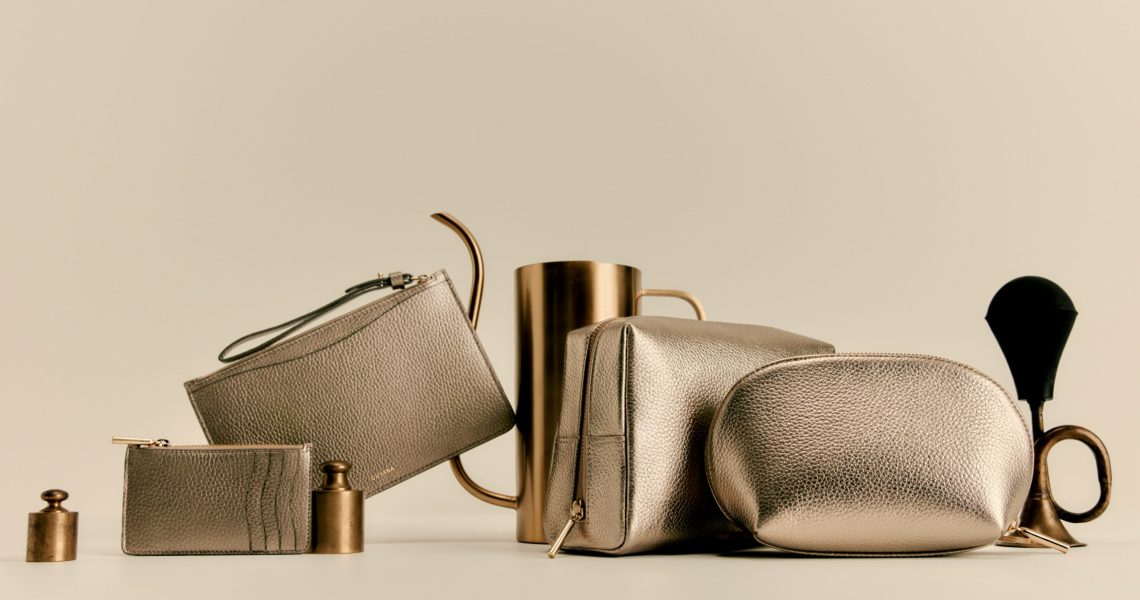One of the biggest brand challenges of 2021 has been the many issues across supply chains due Covid outbreaks, fluctuating fiber prices and transportation obstacles. Could sustainability-focused brands have the solution?
EcofashionCorp: Investing in local communities and technology for buttoned-up production
EcofashionCorp, the social purpose-focused corporation that owns fashion label YesAnd and QVC label Seed to Style, is prioritizing investment in local farming communities. The aim is to increase access to dependable supplies and the adoption of technologies. via improved management of the supply chain and new options for consumers to see the origin of their clothes.
After launching a blockchain-backed traceability platform called The Credible with Inifinchains, a blockchain technology company, last month, EcofashionCorp is now using QR codes to track its holiday knitwear using the system. Marci Zaroff, founder of EcofashionCorp, said, “Through this blockchain technology, we are able to digitize every single touchpoint of our supply chain, from the farm to the spinning to the knitting, weaving, cutting, sewing, printing, dyeing, embroidering and packaging — [some of these steps] may happen 7-10 times in a supply chain.” As more than 70% of carbon emissions come from production processes, digitizing the supply chain can help track legitimate efforts toward sustainability.
The company’s brands have weathered the supply chain issues this year by taking care of their workers and prioritizing company needs. As production of their goods takes place in India, the vast impact of Covid has been difficult to navigate. A deadly second wave of infections swept across the country in May of this year, and last year, the Indian government imposed one of the strictest lockdowns in the world to limit virus transmission. That led to economic damages and hardships for its population and workers.
Sumit Chandra, Managing Director and Partner at BCG, said, “Companies are starting to talk about control and how we define control. In some instances, it can mean that you actually own the supply chain assets. Invariably, and particularly for some of these smaller players, they end up working with a bunch of supply chain partners. Particularly when you’re working with a bunch of third parties, another aspect of control can be how much you’re able to direct them to do what you want, versus what the market factors might require them to do.”
For its part, EcofashionCorp has helped its workers by maintaining a long-term investment in Producers Market. The agriculture trading company, which prioritizes uplifting farmers, is behind a Storybird e-commerce platform that allows for fiber tracking through a blockchain system. Keith Agoada, co-founder of Producers Market, said, “Our partnership is game-changing for the apparel industry. We are providing [EcofashionCorp’s] clients and end-consumers with the sourcing and impact details of their clothing. [doing so] gives customers the ability to choose brands that represent their own values, while building confidence and trust in their supply chains.”
Zaroff said the next chapter of sustainability is rooted in technology. “I’ve been pioneering this sustainable fashion movement for over 25 years. This new chapter of fashion is about digitizing traceability and putting it on a blockchain, where we can leverage the power of technology. And the [focus will be about] blockchain, direct-to-garment printing, robotics and 3D printing.”
Cuyana: Keeping control over supply chains by nearshoring
With many retailers worried about the holiday season, supply chain solves have involved different strategies. Brands that have made ethical supply chains a big part of their strategy have been faced with difficult questions. Many have been around how to invest in continued efforts toward better conditions for workers, while at the same time maintaining hig- quality, quick production and transportation. Cuyana, a fashion brand focused on timeless apparel that lasts, has found an answer in dividing up its production and then nearshoring, which has ensured its products are able to go from order to ship in just three days.
Sustainably made, small leather goods produced in Turkey are Cuyana’s biggest gifting category. In a statement from the brand, it said, “Cuyana is faced with the additional challenge of [enabling] personalization. Each product is different. So leveraging typical colors or sizes, or geography patterns that typically allows for wiggle room within the supply chain doesn’t hold up, making this the most challenging product category.” Cuyana offers monogramming, plus offers personalization via letter charms that can hang off its bags, for example.
However, by ordering its semi-finished products in large quantities early, the company was able to bring it to the U.S. and go past the congested ports earlier than other brands. Karla Gallardo, Cuyana co-founder said, “Most retailers are really suffering from what’s happened in the macro-environment. The key reasons for that are that their supply chains are slow, they have many steps and their timelines are long.”
The brand’s strategy is now to source from domestic vendors located near the brand’s distribution center that are able to carry out the personalization of products, allowing the brand to fulfill orders promptly. According to a report by McKinsey & Co., 71% of fashion companies are planning to increase nearshoring by 2025. Partial nearshoring like this is particularly effective for accessories, as items can be hand-finished in the U.S., helping local craftsmen develop a reputable brand base and expand U.S. production.




